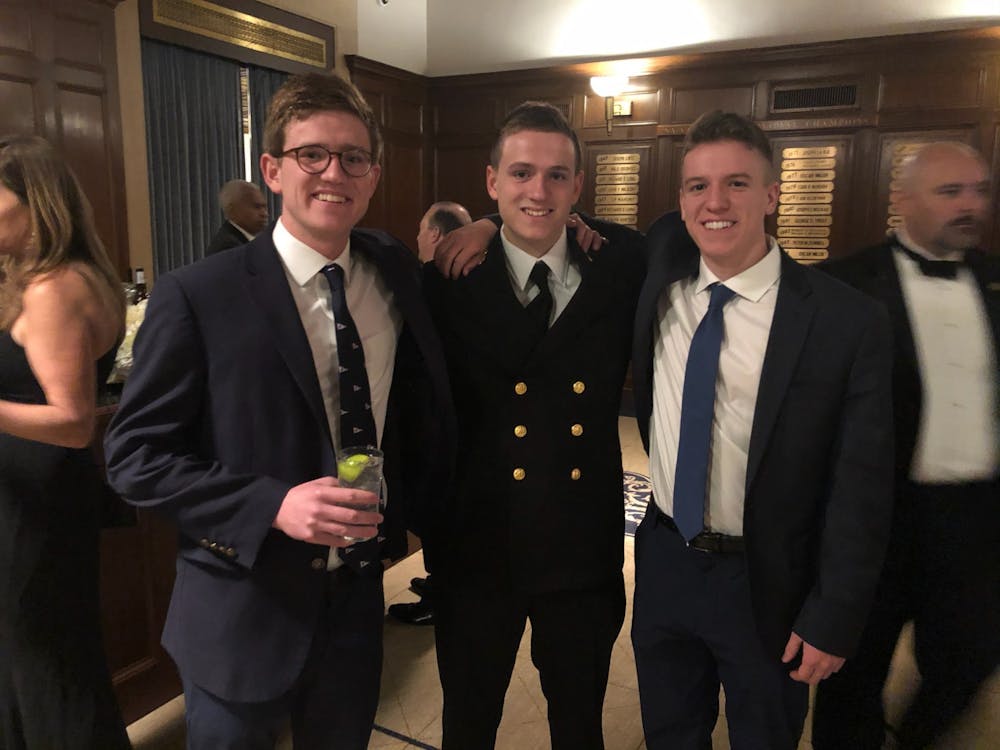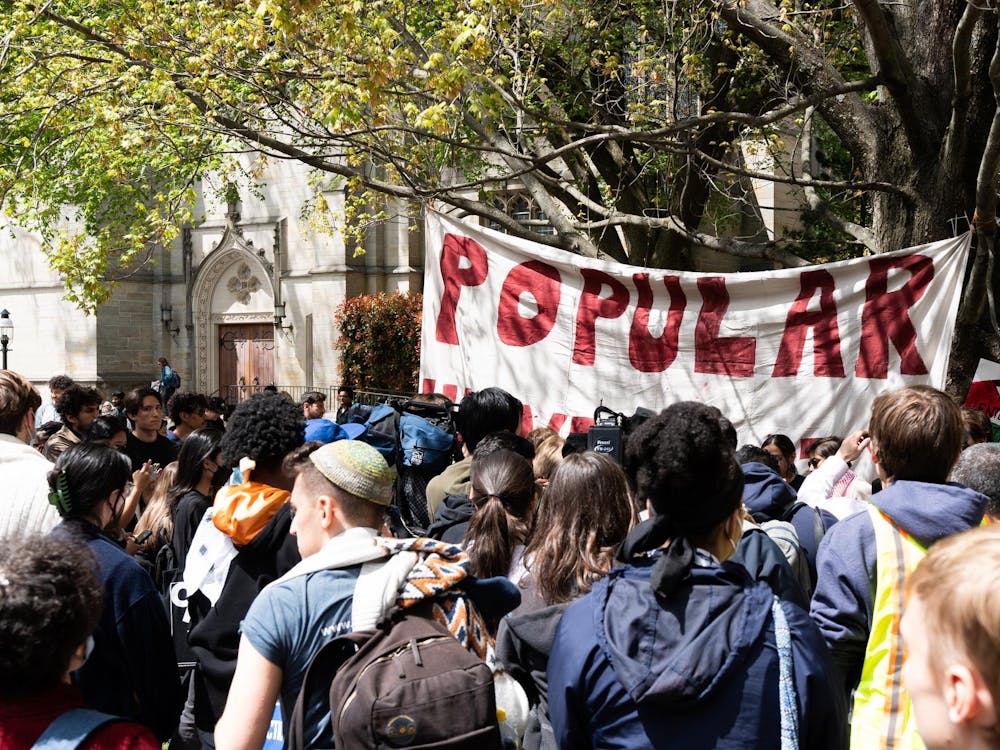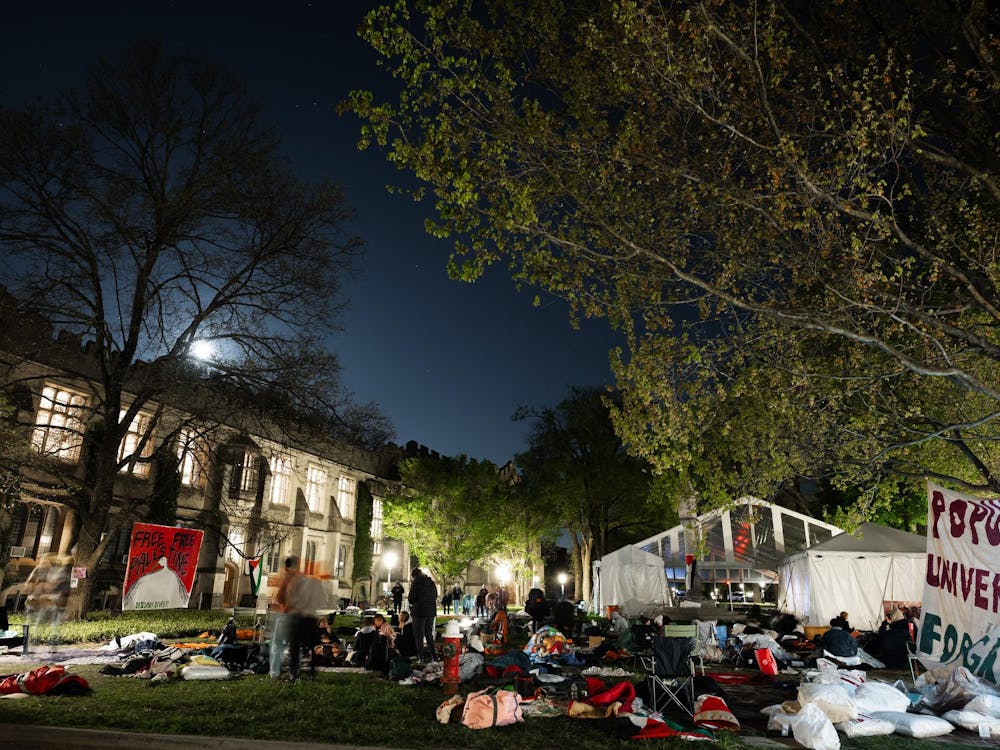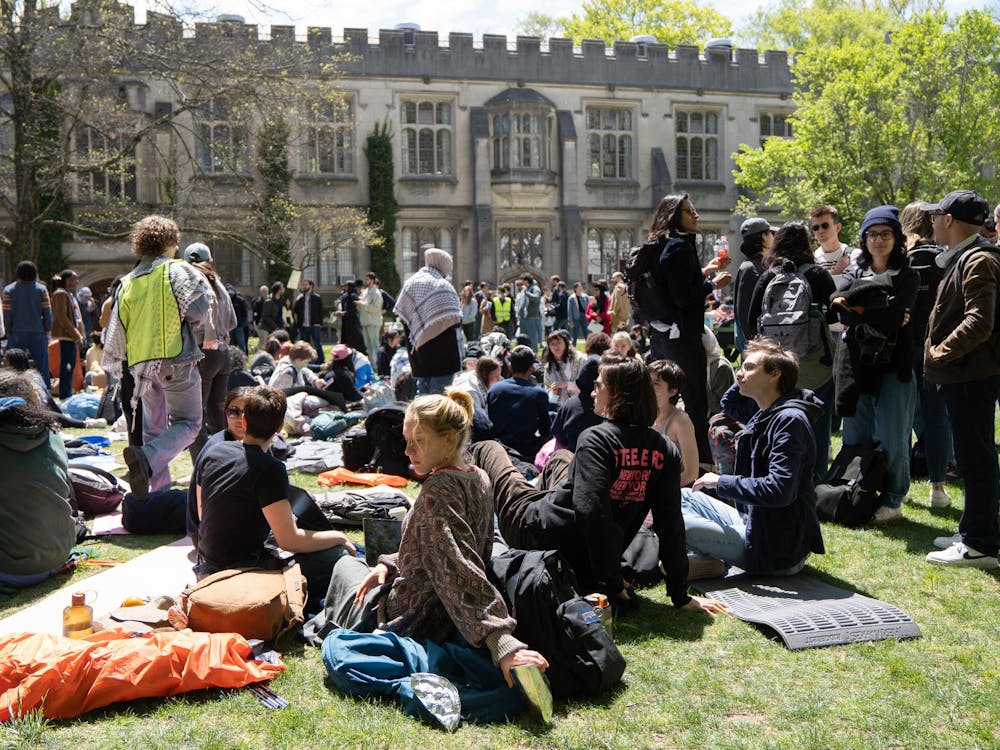Cadet Sergeant Jack Bound ’22 is a sophomore and prospective history major enrolled in the Army ROTC program. His younger brother, Alex Bound ’23, is a Midshipman Fourth Ensign enrolled in the BSE program and the Navy ROTC program.
DP: Jack, tell me a bit about your childhood. Was there something that made you interested in military matters or military service from a young age?
Jack Bound: ROTC and the military is something I’ve wanted to do for as long as I can remember. I remember one of my best friends in primary school — from preschool onwards, we always talked about being soldiers when we grew up. I went back to see him this summer. I remember asking him what he was up to, if he was planning on joining the navy. He was, like, “dude, what are you talking about?” For him, it had been a stupid childhood game, just a dream. But for me it always stuck. Part of that is being in a military family. There’s a general tradition of military service with our ancestors, and my dad affected me primarily.
You have to do all these exercises where you’re asked why do you want to do this, why do you want to do that, why do you want to be an army officer. There are concrete answers I could give you, but oddly enough, I just can’t remember a time where it wasn’t what I wanted to do.
DP: Alex, tell me a bit about yours. What was it like having a brother and a family involved with the Armed Forces? Did that inspire your interest in military service?
Alex Bound: It definitely is encouraging when you have a parent who’s done it, because it confirms for you that it’s a great track to be on, especially in early adulthood. It’s better than just getting out of college and trying to find a job on Wall Street, a really serious job you’ll have to do for 20 years. It’s better to do something you’re really passionate about.
It gives you great perspective on the world, because you’ve seen so many things and had so many experiences. In the military, it doesn’t matter what race, gender, age you are. You’ll have worked with many different people, so that if you ever transition to the civilian world, you’re better equipped to take on whatever role you need to.
DP: Jack, you both arrived on campus in the fall of 2018 as an ROTC cadet. What is your day-to-day life like, and how does ROTC affect your Princeton experience?
JB: I don’t know what a Princeton experience is like without it. It’s definitely something that has to be a massive part of what you’re doing. There’s enough of a time commitment where you can’t half-ass it. We spend 20 to 25 hours a week doing stuff with the battalion, constantly being around the same people, and constantly working towards the goal of commissioning.
For that reason, it is both a significant time investment and a very immersive program. Obviously, that is challenging, but you get used to the day-to-day. You get used to PT three times a week, class and lab for four or five hours on a Friday, going to operations in the field a few weekends a semester. No one in the program is 100 percent sure of what they’re doing, but it’s difficult to be in the program, to be spending all that time, and not be committed to what you’re doing. It certainly is an adjusted experience from what a “normal” Princeton experience might be.
DP: Alex, you arrived on campus in the fall of 2019 as an ROTC cadet. What is your day-to-day life like, and how does ROTC affect your Princeton experience?
AB: Monday, Wednesday, and Friday, you wake up at 4:30 to go to Rutgers. You have class afterwards on Mondays and Wednesdays, which is just naval science. And Friday afterwards, you have drills: close-order drill, which is just kind of marching around with guns, or someone might come to talk to us about the Navy and different communities within it.

It’s great because you become really close with the other freshman, and get really good mentorship from the upperclassmen, who are all juggling ROTC and really difficult degrees. It’s definitely been a positive experience overall.
DP: What do you think is different about your two ROTC experiences? What do you think is similar?
JB: I wouldn’t necessarily say this if I were interviewing for the Army, but I actually always wanted to do the Navy. My dad was in the Navy. I specifically always wanted to do Marines. Army happened to be on campus. And I figured that doing Infantry would be kind of a similar thing.
The Navy has always been the tradition of our family; we were always swimming and sailing. In general, though, I think our day-to-day experiences are pretty remarkably similar. Military science versus naval science might be different, the type of tactics we practice in the field are different. But a lot of the structures are the same.
AB: With the Navy it’s a bit different, just because it’s diverse in terms of what you want to do. You can do submarines, ships, special warfare, flying a plane. Versus the Army, the majority of people just want to be — and end up — shooting guns. Army ROTC does field weekends, when you march around in a forest and practice those movement exercises. Navy does much less of that. There’s some stuff that’s just for marines. A much smaller percentage of people want to do that conventional type of warfare. A lot of people just want to do surface warfare, which is being on a ship. It’s a more intellectual focus as opposed to a more physical one.
JB: The way the Army are trained, everyone is trained as an infantry officer across the board. Everything we learn is based around platoon tactics, because that is seen as the bedrock of developing leadership, rather than necessarily tactical knowledge. It seems like in Navy, they give more attention to what people are going to be doing. That has both its drawbacks and its merits.
DP: Jack, how do your studies inform your experience as a cadet?
JB: I’m probably going to be a history major. I decided that something I wanted to get out of my degree was a focus on reasoning, writing, developing of a critical mindset towards things, being able to argue, and trying to find the true essence in everything you’re studying. As a broad frame of mind and set of skills, that is what I wanted to get out of it. That is what I think the most important application would be to anything, but especially with the military, given the kind of decision making you have to make on the ground. In leadership, you have to be able to look at situations critically and decide what the best course of action is going to be. You have to have strong convictions in that sense.
You need to develop the mindset of taking into account all the information you have and making decisions on the fly. The same skills that are developed in a literary liberal arts education are similar to the skills that are most valuable in an Army leader.
DP: Alex, how do your studies inform your experience as a cadet?
AB: I’m doing engineering. Obviously with math and science, you’re able to deconstruct problems systematically. A lot of the times it’s pretty abstract. You have to take really small steps and see where it leads. That’s pretty helpful. As Jack was saying, you constantly wrestle with pretty big problems day-to-day in the military. If you can trust the systematic problem-solving approach, you’ll probably be better for it.
DP: Jack, do you have an idea of what you want to do after graduation and commissioning?
JB: I’m hoping to commission as an infantry officer. This is a little facetious, but I remember my dad’s employment advice. In any company or in any job that you’re applying to, you want to do what the company does. The entire Army is constructed around letting men on the ground execute the mission as best as they can. In my sense, I think where I’d like to be is at the tip of the spear, centered around actually competing objectives and performing the primary missions of the Army, as opposed to a supporting role. Although all jobs really are equal and just as significant. You can’t launch a campaign without supply lines, finances, communication, artillery support. It all contributes towards a common goal. But specifically in my vision, I want to do what the Army does. What the Army does is fight.
DP: Alex, do you have an idea of what you want to do after graduation and commissioning?
AB: Seals. I’ve always loved being really physically active and through difficult experiences, gaining a closer bond with whomever you’re with. In high school, Jack and I did swimming. It’s a really tough sport, really physical. During those really hard workouts, you get closer with your friends. And of course watching all those cool movies like Lone Survivor and American Sniper is what really inspires the most patriotism, makes you want to do something like that and fire guns and be in the forest and stuff like that.
DP: Jack, what aspect of ROTC challenges you the most?
JB: Balancing the time, though that’s every Princeton student. Obviously time management is tough with everything everyone wants to do and get done. With ROTC that’s particularly difficult.
ROTC is incredibly well-run. But what I think is great training for the Army as a whole is that as with any organization, there’s difficulty, bad decisions get made sometimes, accidents happen sometimes. It’s a human-led organization. Our command team is seniors right now. They have all this stuff to do. They’re basically running an entire program. There’s difficulty at every level in the chain of command. That’s really cool — it’s important training. All the Armed Forces try to be the best they can be, but mistakes happen. Leaders make bad decisions sometimes. That is all to say that at the end of the day, it’s an organization of human beings. The difficulties and setbacks related to the incredibly difficult task of organizing 50 cadets is incredibly good leadership training. What happens when things go wrong? What happens when you don’t like your platoon leader? You work around things. It’s great training in terms of the interpersonal aspect, the leadership aspect.
DP: Alex, what aspect of ROTC challenges you the most?
AB: The time and waking up early. If you’re waking up at 4:30 the next morning, you have to makes sure you’re going to bed at a reasonable time. You still get the weekend off, still have free time.
DP: What is the single greatest thing ROTC has taught you?
JB: That the true strength of any organization, but especially the army, lies in its people. Not the uniform or the weapons or the funding or whatever else. People make or break the mission
DP: How do you think that Princeton ROTC and general military service fits into the University’s motto of ‘in the nation’s service and the service of humanity?’
AB: We were at this dinner on Monday night, which celebrated the 100th anniversary of ROTC at Princeton. The lead speaker was talking about how a lot of the time, people don’t associate Ivy League schools and academia with the military. But there’s been so many great military leaders to graduate Princeton, like General Cavoli and General Milley. The military definitely needs competent capable people leading the ranks. If you have a passion for academia and military service and combining the two, it’s amazing to be in ROTC.
JB: It’s great that at Princeton, you have people preparing to serve at the highest levels in all levels of society, whether that’s in health, in business, in government, in public service. I think it’s fitting that in that regard we should also have a growing tradition of growing warrior leaders here, too. If Princeton is in the service of the nation and prepares those who are likely going to be the leaders of our country, I think in the same way we should be preparing the future leaders of the military.









